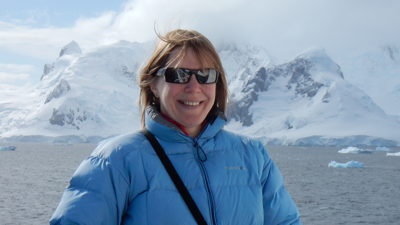Jane Rumble OBE has been awarded the 2023 Back Award for her outstanding commitment to shaping public policy in polar settings. We spoke to Jane about her greatest career achievements and why the polar regions are so important.
What do you consider to be your greatest achievement to date? What are you most proud of in your career to date?
I am so lucky that I get to work with a wide range of UK-based polar stakeholders, who all share in the objective of keeping these regions peaceful, cooperative and sustainably managed. The shared vision and commitment of policy-makers, lawyers, scientists, environmentalists, industry representatives, heritage experts and many others helps ensure the UK engages on all aspects of polar governance and that we play our part in seeking to conserve their natural values for future generations. More recently, we have developed a Diversity in polar science initiative and I am so incredibly proud that every part of the UK polar community has embraced this willingly and enthusiastically. There are more women in the UK’s polar leadership than there have ever been, and whilst we have much, much more work to do, we have also successfully supported a number of initiatives to engage people from underrepresented groups in polar science. The future of the polar regions matters to us all, and we need to ensure we attract a diverse range of talent to rise to the challenge!
How have geography and geographical insights shaped your career?
I am an enthusiastic human and physical geographer, and the polar regions are like a geography masterclass! Changes in the polar regions not only impact on the regions themselves, and notably on those who call the Arctic home, but these changes also have profound implications for the rest of the planet. Geography drives a curious, holistic approach, with a particular focus on interconnectivities. The polar regions present fascinating and globally significant challenges, and every day is different. I may be biased, but I would say that working on polar issues is a dream role for any geographer!
Why are the polar regions so important? How do you think this will evolve in the future?
The polar regions drive our climate, change our sea-levels, and influence our weather. Both Poles have regions that are warming more than three or four times the global average and these changes affect everyone. What happens in the polar regions does not stay there. Understanding the rate of these changes is critical to planning our future – from flood defences to crop rotations. But, as these regions lose their protective ice they also become more accessible, which in turn has the potential to drive competition and increase the risk of conflict, if not effectively managed. My primary hope for the future of the polar regions is that the world achieves the objectives set out in the Paris Climate Agreement to avoid dangerous climate change and I also hope we will continue to characterise these regions by scientific cooperation and international collaboration.
What advice would you give to someone wanting to go into a career focused on the polar regions?
There are so many routes to working on polar issues, whether as an entire career focus or just for a short period. I couldn’t recommend it highly enough – if you get the chance to engage with polar issues, please grab it!
Is there a particularly memorable moment in your work you would like to share?
This question is almost impossible to answer, but I think arriving in Antarctica for the first time – after two days of horrendous seasickness! – was just incredibly humbling. The clarity and crispness of the air took my breath away as much as the incredible ice-covered mountains and enormous icebergs. The incredible beauty, but also vulnerability, was overwhelming. I have sought to ensure that I maintain the conviction I felt in that moment that we need to do all we can to ensure the protection of this amazing region. The vast majority of those who are lucky enough to visit Antarctica love it, but we must also ensure that we collectively don’t love it to death.

